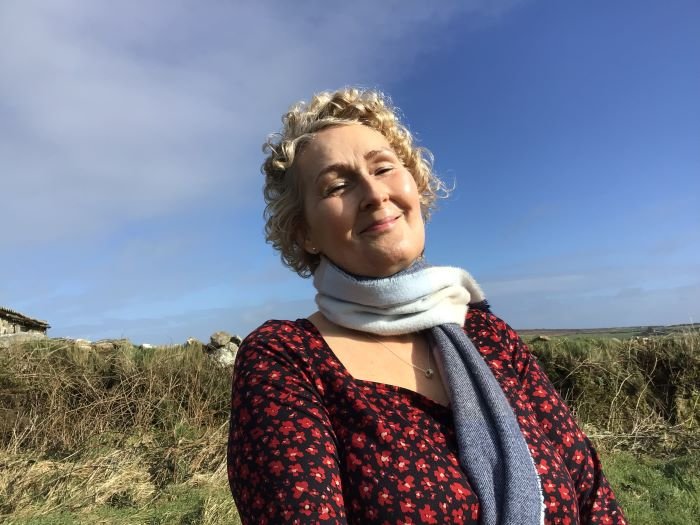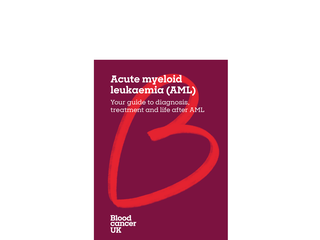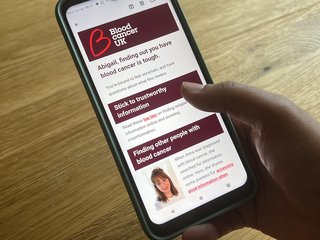Finding hope when you most need it
Rebecca was diagnosed with acute myeloid leukaemia (AML) after struggling with breathlessness on a walk. She was treated with chemotherapy and a stem cell transplant after finding out about a genetic mutation that made her higher risk. Here she tells her story of finding hope at the times she needed it most.

Rebecca, diagnosed with AML
Fear at first
When I was first diagnosed with AML, I was terrified. I was weeping but trying to hold it all in, because I didn’t want my son to see me sobbing, or for him to experience the fear that I was feeling. We had lost a best friend to cancer, and this made my mind go to the worst when I was diagnosed. Getting a cancer diagnosis so soon after his death made it even more important for me to find some hope to cling on to. I needed to believe things were different for me, that I was going to be alright.
Realising I needed a different mindset
It quickly became apparent to me that I needed to get a grip on my emotions and find a way to feel better about my situation. It’s important to gather your mental strength in whatever way you can, whether through speaking to friends or family, having some quiet time so you can process your thoughts, or finding distractions – do whatever it takes to find a way to cope and move into a more positive mindset.
I’ve had depression at points in my life previously and have been on anti-depressants. But since my AML diagnosis, I’ve developed coping methods for my mental well-being. I want to share them here, so that anyone reading knows that it is possible to go from being prone to depression, to feeling resilient and positive.
Finding what works for you
Some people really want the emotional support of friends and family and to be in regular communication with them. But I need time alone on my good days, and on my bad days! When things got particularly tough, I needed to curl up alone with my thoughts and let them be for a little while. Everyone has their own way of coping, so listen to what works for you.
Seeing a healthy future
I had used hypnotherapy in the past and it had been good for me, so I tried it again this time. I found some guided hypnotherapy tracks on YouTube which helped me to imagine my perfect health and encouraged me to feel positive about my future. I visualised my blood cells protecting me from cancer and my body being the strongest it’s ever been. I told myself I would be alright, that I would get through this, and that I would be well. When I found out I needed a stem cell transplant, I found a track specifically about stem cells, where you imagine the stem cells going into your body and working to make you better. I did this every day up to my transplant as a way of feeling more in control of the situation and hopeful for the success of my transplant.

Rebecca helped create our guide to AML
She shares more of her story in the booklet, which also covers diagnosis, treatment, coping with AML and life after AML.
Obstacles along the way
I was devastated when I learnt I had a genetic mutation that meant I needed a stem cell transplant. I had been expecting some good news from the test results, so it was a shock and I cried. But then I went back to my coping mechanism of hypnosis to get on top of my emotions. I used it as a tool to overcome all these little dips, as it made me more emotionally steady and determined to be well.
My mindset shifted and I realised that having a stem cell transplant would give me a much better chance of staying alive and I took that as a positive. I saw the genetic mutation as a passport for the best treatment there is. I was still worried going into my transplant, but I trusted the doctors and I really believed that I’d be okay.
Before my transplant, I was told there was damage to my heart because of my treatment and I felt heartbroken. We have a lot of emotional attachment to our heart, and I associated it with the emotion of love. Knowing my heart was damaged was difficult at first, but I tried to see it in perspective – I would take a hit to my heart to get through the AML, as I’m just so appreciative of being alive! My heart will be monitored forever, but I see this as a good thing. I’m lucky to feel safe that if anything ever goes wrong, it will be picked up on quickly.
How AML has changed me
I’m so grateful for every day I get to be here, that I feel so much more resilient now. I appreciate things so much more and my relationships are deeper with those I love because we saw how terrible it would be to lose what we have.
My experience with AML made me and my husband focus on what’s important rather than the trivialities of life. The treatment was obviously very frightening both for me and my family, but as soon as it finished, we’ve been finding so many positives and recognising how fortunate we are to have each other.
I feel incredibly hopeful about my future now for three reasons. My treatment has been successful to date, and I do all I can to take care of my health. I’m out walking in the fresh air every day with my dog, which gives me a boost of good endorphins. And I’m confident in my team of medical professionals who got me here.
One thing I’ve learned
What worked for me personally above all else was the power of believing in my future. During treatment, I imagined my future self speaking to my present self, telling me I would be healthy, fit and well. I kept telling myself this throughout my journey with AML, and it helped me believe it would happen.
If you're looking for more information on how to look after your mental wellbeing during treatment for blood cancer, you can contact our support service. We help people talk through their feelings around their treatment for blood cancer.

Get a weekly support email from us
We'll send you clear and simple information, practical tips, and advice from other people with blood cancer, to help during the first few weeks and months after diagnosis.
